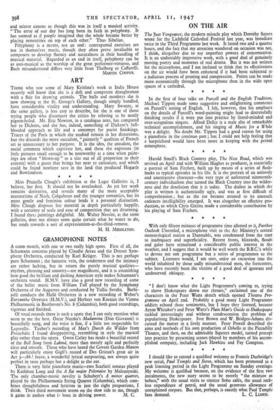GRAMOPHONE NOTES
A GOOD month, with one or two really high spots. First of all, the Schumann concerto played by Claudio Arrau and the Detroit Sym- phony Orchestra, conducted by Karl Kruger. This is not perhaps pure Schumann ; the fantastic vein, the tenderness and the intimacy are rather lacking, but in return the purely musical qualities— rhythm, phrasing and sonority—are magnificent, and it is astonishing how good the brilliant and dashing American style makes Schumann's orchestra sound. H.M.V. have also a good new recording of some of the ballet music from William Tell played by the Symphony Orchestra of the Auguste° and conducted by Tullio Serafin. Barbi- rolli conducts the Halle Orchestra in a new recording of Webees Euryanthe Overture (H.M.V.), and Herbert von Karajan the Vienna Philharmonic in Beethoven's No. 8 (Columbia), both good recordings, vigorous and finished.
Of vocal records there is such a spate that I can only mention what seem to me the best. Oscar Natzka's Madamina (Don Giovanni) is beautifully sung, and the voice is fine, if a little too respectable for Leporello. Tauber's recording of Max's Durch die Welder from Freischiitz I found disappointing, resembling in style the musical play rather than the opera. Gwen Catley has made a beautiful record of the Bell Song from Lakmi, more than merely agile and perfectly clear and smooth. Those who have heard the Covent Garden Manon will particularly enjoy Gigli's record of Des Grieux's great air in Act 3—Ah fuyez, a wonderful lyrical outpouring, not always quite perfect in taste perhaps but a delight to the ear.
There is very little pianoforte music—two Scarlatti sonatas played by Kathleen Long and the A flat major Polonaise by Malcuzynski. The only chamber-music novelty is Schubert's A minor quartet, played by the Philharmonia String Quartet (Columbia), which com- bines thoughtfulness and lyricism in just the right proportions, I think. Their third movement seems on the slow side to me, though it gains in pathos what it loses in driving power. M. C.


































 Previous page
Previous page